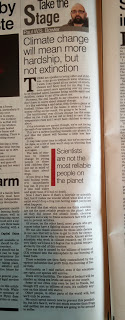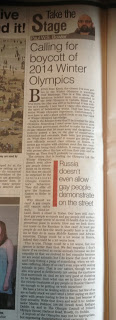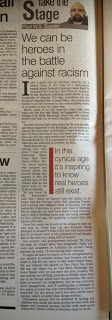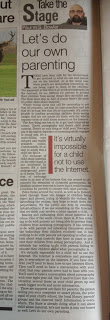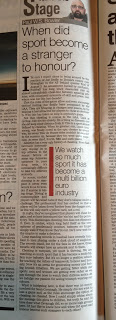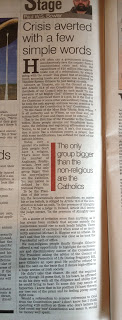My column in The Kerryman. 9 October, 2013
There are upsides to being older and childless. I can go on weekends away whenever I want. I can spend all my money on smelly cheeses and fancy food for my dog. I can even spend years agonising over my never to be finished novel, because being middle-aged and childless, means it can all be about me. However, the real benefit to my situation is that I don’t have to worry about climate change.
It’s like watching a mid-table, fifth division game of football. Unless one of the teams is mine or I have money riding on the result, I’m going to be bored. The ‘controversy’ over climate change has the same effect on me. I will be too old or dead to care if the temperature rises and I won’t have children to worry about.
If the scientists are correct though, we’re not facing the end of our species. We’re not headed to extinction. This isn’t a meteor hurtling towards our planet. It’s just that the planet will become a little less hospitable. It may take some time to adjust, but we’ve survived Ice Ages, so a bit of heat won’t stop us winning Sam again and again and again.
The lack of reaction to climate change by young people or those with children does put me in mind of that story about frogs. If you drop a frog into boiling water, it’ll immediately hop out. If you put it into cold water and apply heat, it’ll boil to death. Now I don’t know if that’s a fairy tale or scientific fact, but it makes me wonder about what kind of scientist would drop a frog into boiling water, just to see what happens.
It’s stuff like that which makes me think scientists are not the most reliable people on the planet. After all they did invent the atomic bomb, chemical weapons and a way to freeze someone’s face with poison to prevent wrinkles. Of course on the other hand, most people who get cancer today, have a fighting chance at survival. We can also thank scientists for those little devices in our cars that tell us how to get to Cork for chemo.
It’s hard to know who to trust really. Almost all the scientists who work in climate research say it’s now very likely we’ll have a 2 degree rise in global temperatures by the end of this century. They say this is caused by the billions of tonnes of CO2 released into the atmosphere by our burning of fossil fuels. These scientists are then flatly contradicted by the various industries that profit from the burning of fossil fuels.
Fortunately, as I said earlier, even if the scientists are right, our species will survive. There will be hardship. The island of Ireland will be smaller as rising sea levels eat away at our coasts. Some of our cities may even be lost to floods, but though it’ll cost us billions of euro, it’s unlikely anyone on this island will starve. Other people, in other parts of the world will, but we’ll only be poorer.
We could spend money now to prevent this possibility, but let’s face it, we’re not much smarter than frogs and neither me nor my genes are going to be around to suffer.
